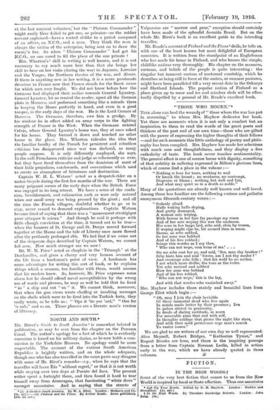" THOSE WHO MOURN."*
TIME alone can heal the wounds of " those whom the war has put in mourning," to whom Mrs. Mayhew dedicates her book. Yet there are moments when it is not only a comfort but. an inspiration to them to read the words of the great poets and thinkers of the past and of our own time—those who are gifted with the power of expressing the higher thoughts of their fellows —and for, such momenta this little anthology of poetry and philo- sophy has been compiled. Mrs. Mayhew has made her selections with much care and thoughtfulness, and they display a fine catholicity of taste. The book never touches sentimentality. The general effect is one of sorrow borne with dignity, something .of that nobility in suffering expressed in Milton's glorious lines, which of course find a place in the volume :— " Nothing is here for tears, nothing to wail Or knock the breast ; no weakness, no contempt, Dispraise or blame ; nothing but well and fair, And what may quiet us in a death so noble."
Many of the quotations are already well known and well loved. Among those less familiar are the following curious and pathetic) anonymous fifteenth-century verses :- " Sodenly afraid Halfe waking halfe sleping, And gretly dismayed, A woman sate weping, With favour in her face far passings my reson And of her sore weping this was the enohoson. Her sone in her lappe laid, sche seid, slein by treson,
If weping might ripe be, hit seemed then in seson.
Ihesus, so ache sobbed, So her sone was bobbed And of his live robbed ;
Seinge this wordes as I sey thee, ` Who can not wepe, corn lerne of me.' . . .
On me ache cast her ye, and seid, See, man thy brother I' Sche kiate him and seid Swete, am I not thy moder ? ' And swoninge sche fella ; thet hit wold bo no nother.
I not which more dedlie, the tone or the toder.
Yet ache revived and sobbed
How her sone was bobbed
And of his live robbed.
` Who can not wepe,' this is the lay, And with that wordcs ache vanisched away."
Mrs. Mayhew includes those stately and beautiful lines from George Eliot which begin :-
" Oh, may I join the choir invisible
Of those immortal dead who live again In minds made better by their presence ; live In pulses stirred to generosity, In deeds of daring rectitude, in scorn For miserable aims that end with self, In thoughts sublime that pierce the night like stars, And with their mild persistence urge man's search To vaster issues."
We are glad to see writers of our own day so well represented. Alice Meynell, Robert Bridges, " Katharine Tynan," and Rupert Brooke are hose, and there is the inspiring passage from a letter from Captain Norman Leslie, killed in action early in the war, which we have already quoted in these
columns. a


































 Previous page
Previous page